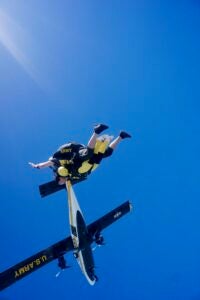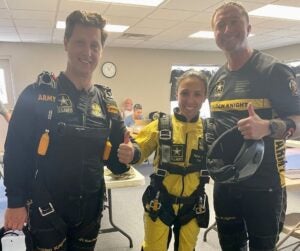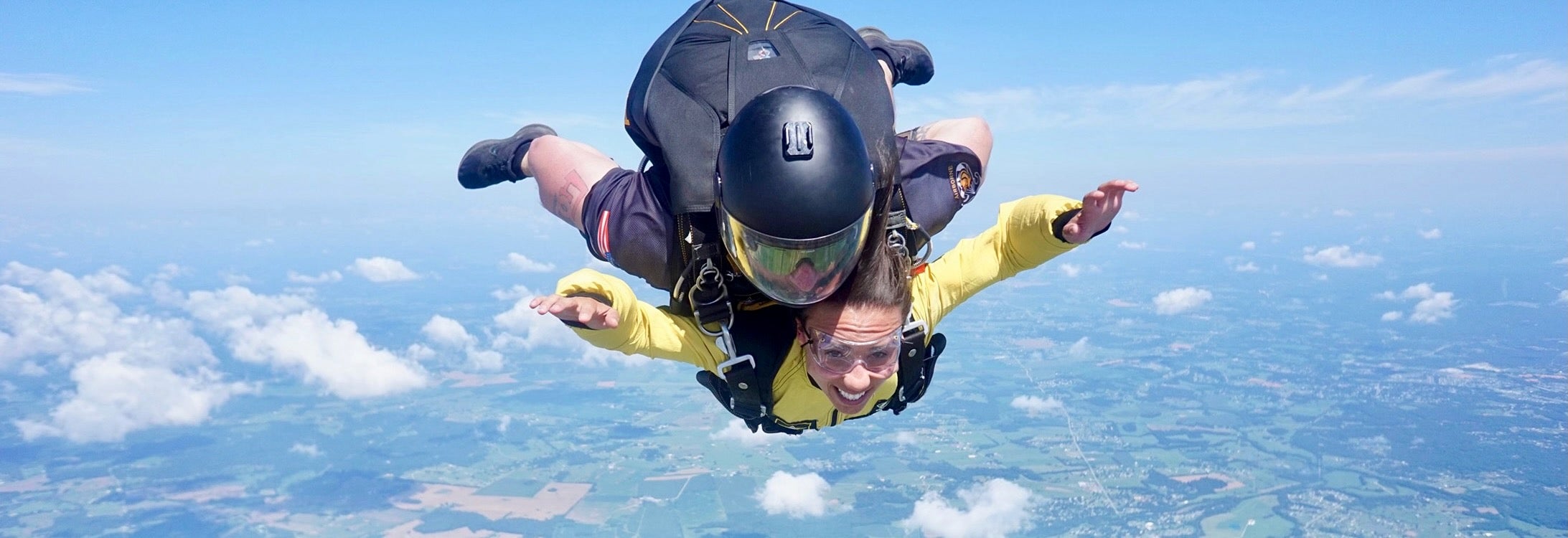A golden opportunity seized by Habeeb
Obstacle courses were the focus of initial discussions between Lt. Col. Josh Aeschliman and East Carolina University Department of Kinesiology assistant professor Dr. Christine Habeeb.
Habeeb, a former cheerleader at the University of Kentucky, said she loves obstacle courses. It wasn’t until later when Aeschliman, commander of ECU Army ROTC, revealed that skydiving with the U.S. Army parachute team, commonly known as the Golden Knights, was a possibility while they attended the U.S. Army Cadet Command’s centers of influence tour of summer training in Fort Knox, Kentucky.

A unique view of Christine Habeeb flying over Fort Knox, Kentucky.
Habeeb, indeed, was selected to jump. After many different thoughts and with qualitative observation in mind, she agreed and jumped successfully during the mid-July event.
“I wanted to know what the experience was like,” Habeeb said. “When we had the 112th Special Operations Signal Battalion from Fort Liberty visit us in February, a lot of them were airborne, so a lot of the talk was about what it’s like to be in the plane before you jump. … That’s really why I was interested. I knew I needed to do it, and I knew this was the best way to do it was with the Golden Knights. You never are going to do it safer.”
The mindset to jump out of a plane was what intrigued Habeeb. She also thought the learning experience would make her a better researcher in sport psychology.
“Real-world experiences make research better and it 100 percent is something I will use in class,” she said. “The experience of being uncomfortable is definitely what I was trying to observe, and how the leaders in that situation helped people through it and how they instilled confidence in people. I knew I would be uncomfortable and through sport I was somewhat used to it, but definitely not to this level of performance anxiety to jump out of a plane. It’s been a while. My feet have been on the ground for a long time.”
A rewarding moment for Habeeb happened when the Army representative connected to her inside the plane participated in deep breathing exercises. Habeeb is plenty familiar with how breathing can affect anxiety.
“He took deep breaths and told me that he’s been doing this for 12 years and he always does it,” Habeeb said of their conversations as they were preparing to reach the desired altitude. “I said, ‘I love deep breathing, I do sports psychology, so let’s do it together.’ So we actually synched up breathing, which was very cool from a research side, because that’s what you’re supposed to do when you’re anxious. You can adjust your breathing to relax. It actually works. I was much calmer for a few moments.”
Jumping with Habeeb were Sgt. 1st Class Blacke Gaynor (tandem instructor) and Sgt. 1st Class Reese Pendleton (videographer).
Aeschliman was appreciative of Habeeb’s approach to the training event.
“It has been great sharing the Army life with Christine and her students during research projects,” Aeschliman said. “By Christine understanding us better, she is able to assist in explaining what it is that we do to others at ECU. The fact that we chose someone so willing to try the obstacle course, jump off of a tower, and then jump out of a perfectly good airplane was a bonus to the knowledge that was gained on both sides. I can’t thank her enough for having an open mind about this trip.”
There were many colleges and universities represented at the training, including institutions such as The Citadel, Norwich University, Virginia Military Institute, Virginia Tech, Wake Forest University, Furman University, Wofford College and Elizabeth City State University.
This exhilarating experience is an obvious highlight in Habeeb’s long-term approach to supporting ECU’s Army and Air Force ROTC units. As Habeeb and other field experts study leadership, stress, performance anxiety and other topics related to military and sports, there continues to be opportunities for collaboration within the College of Health and Human Performance.
“I have no military background and then I started to realize with all my sport team dynamics material, it’s helpful and useful,” Habeeb said. “I’m trying to do anything I can to understand the world and the context. Getting involved in ROTC was that first step.”

Habeeb with Golden Knights — Sgt. 1st Class Blacke Gaynor (tandem instructor) and Sgt. 1st Class Reese Pendleton (videographer)
